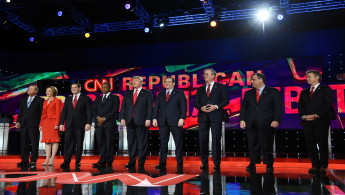National security centre stage at GOP presidential debate
In a presidential race reshaped by national security concerns, Republican front-runner Donald Trump defended his provocative call for banning Muslims from the US on Tuesday with some candidate saying they understood why he made those statements.
Tuesday night's debate was the first for Republicans since the attacks in Paris and San Bernardino, California, which heightened fears of terrorism in the United States.
Trump's statements dominated much of the discussion heading into the debate, while he said he wasn't seeking to discriminate against Muslims.
"We are not talking about isolation; we're talking about security," he said. "We are not talking about religion, we are talking about security."
Struggling former Florida Gov. Jeb Bush found his footing in trying to discredit Trump's qualifications for the White House, chiding the brash billionaire for trying to "insult your way to the presidency."
Bush dismissed the proposal as unserious, saying: "Donald is great at the one-liners, but he's a chaos candidate and he'd be a chaos president."
Texas Sen. Ted Cruz, a rising star who is challenging Trump's months-long lead in Iowa is trying to pitch himself as a more electable alternative to Trump.
However some Republican leaders believe his hard-line conservative positions and prickly demeanor would put him at a disadvantage in a general election contest against Democratic front-runner Hillary Clinton.
Florida Sen. Marco Rubio has also entered the top tier in the crowded field by seeking to straddle the divide between his party's establishment and more conservative wings.
Yet, Cruz and Rubio said they understood why Trump had raised the idea of banning Muslims and avoided directly criticising the front-runner.
Talking tough
Instead, they went after each other, engaging in lengthy debates over their differences on national security and immigration, one of the most contentious issues in the Republican primary.
The senators also displayed differences in their strategies for targeting the Islamic State group (IS).
Cruz called for using "overwhelming air power" and "carpet-bombing" to destroy IS, while Rubio said airstrikes would have to be supplemented by ground troops, including American special operations forces.
New Jersey Sen. Chris Christie also sought to assert himself in the national security discussions by calling for a no-fly zone over Syria and vowing to shoot down Russian planes that violate that space.
"We would shoot down the planes of Russian pilots if, in fact, they were stupid enough to think that this president was the same feckless weakling that the president we have in the Oval Office is right now," said Christie.
The debate's focus on national security was a detriment for retired neurosurgeon Ben Carson, who has struggled on complex international matters. He punted on questions about surveillance and his own qualifications for being commander in chief.
Also on the main stage Tuesday night was former business executive Carly Fiorina; Ohio Gov. John Kasich and Kentucky Sen. Rand Paul.
Competing for attention
The first debate of the evening was the undercard debate, where the four candidates who have not done very well in the polls had one of their last chances to prove themselves in a televised debate.
Candidates did not waste a moment in their attempts to appeal to far-right voters, and early into the debate former Pennsylvania Senator Rick Santorum declared: "We have entered World War III," in reference to the threat posed by the Islamic State group (IS).
Santorum then went on to arguing that Islam is not just a religion, but a political governing structure and legal system that is not afforded the same constitutional protections as other religions.
"The fact of the matter is Islam is different," said Santorum to which former Arkansas Gov. Mike Huckabee agreed.
However, unlike the other candidates who were attempting to sound more like Trump to climb in the polls, South Carolina Sen. Lindsey Graham slammed Trump's proposals and apologised to Muslims for the statements made by the billionaire candidate.
"I am sorry. He does not represent us," said Graham who added that Trump's proposals were a coup for IS who "would be dancing in the streets, they just don't believe in dancing."



